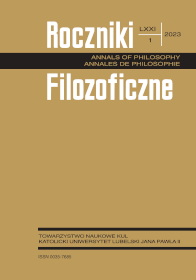ONTOLOGIA SPOŁECZEŃSTWA, DOBRO WSPÓLNE I KONTESTACJA. WOKÓŁ PEWNYCH KATEGORII PAŃSTWA REPUBLIKAŃSKIEGO W UJĘCIU PHILIPA PETTITA
SOCIAL ONTOLOGY THE COMMON GOOD AND CONTESTATION: ABOUT CERTAIN CATEGORIES OF PHILIP PETTIT’S ACCOUNT OF THE REPUBLICAN STATE
Author(s): Rafał Paweł WierzchosławskiSubject(s): Political Philosophy, Government/Political systems, Sociology of Politics, Ontology
Published by: Towarzystwo Naukowe KUL & Katolicki Uniwersytet Lubelski Jana Pawła II
Keywords: republicanism; common good; contestation; social ontology; non-domination;
Summary/Abstract: Philip Pettit is one of the leading philosophical codifiers of the [neo-]republican conception of freedom and government, which is guided by the ideal of non-domination (empire and dominion). At the same time, he is the author of many important works in the areas of philosophy of social science (the question of explanation and interpretation), ethics (consequentialism), social ontology (how social groups exist) and philosophy of mind (how the intentional subject functions). In light of the criticisms and polemics that have emerged from the new ‘republican wave,’ to use this term, proponents of populist republicanism (John P. McCormick and others), who accuse representatives of an earlier generation of the republican tradition like John G.A. Pocock, Quentin Skinner and especially exactly Philip Pettit of aristocratic ‘deviation’ (only the upper classes and elites benefit from the project of depoliticizing the republic), it is important to point out the relevance for a reading of the republican project of the solutions developed by Pettit in social ontology. The author puts forward the thesis that it is only by considering his position in social ontology that his proposals in political philosophy can be fully understood (which does not mean accepted). The structure of the article is as follows: (1) the author presents the three dimensions of social ontology as seen by Pettit; (2) he then shows their relevance in defining the category of the common good, in the context of a republican political community (condominium model); (3) he points out some paradoxes related to the realization of the republican ideal of civic contestation. At the same time, author draws attention to the evolution of the republican project (certain aspects of it) in relation to analogous evolutions of propositions (solutions) in social ontology.
Journal: Roczniki Filozoficzne
- Issue Year: 71/2023
- Issue No: 1
- Page Range: 183-212
- Page Count: 30
- Language: Polish

